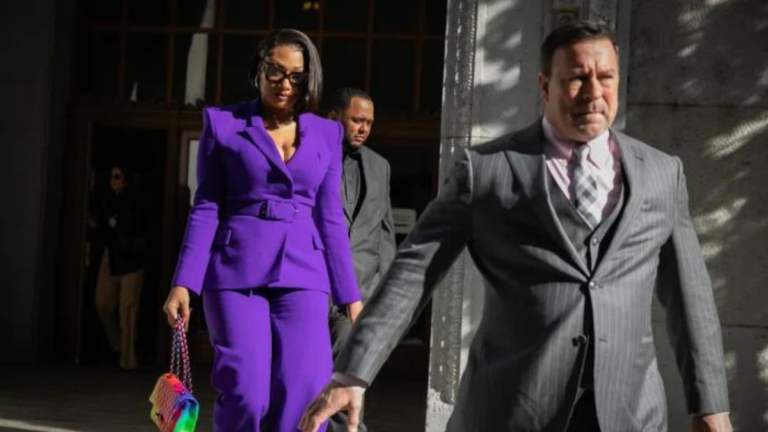
The Grammy-winning artist has been the subject of intense examination due to misinformation and rampant conjecture.
By Channing Hargrove
Tory Lanez, a rapper, was found responsible in the shooting death of Megan Thee Stallion in 2020. A juror in Los Angeles found him of assault with a semiautomatic handgun, transporting a loaded, unregistered weapon in a vehicle, and discharging a firearm with gross carelessness after two days of discussion. He could be imprisoned for up to 22 years and eight months. Following the giving of the judgment, he was arrested.
“Women, especially Black women, are afraid to report crimes like assault and sexual violence because they are too often not believed,” said Los Angeles County District Attorney George Gascón. For the second time this month, this trial emphasized the countless ways in which our community can do better for women.” While the prosecution, like the event as a whole, has split the Black community, it’s been exasperating to watch Megan Thee Stallion argue for her privacy as well as her humanity.
Megan Thee Stallion, born Megan Pete, spent four hours on the witness stand on December 13 during Lanez’s attack prosecution. (born Daystar Peterson).
“I wish he’d just shot and killed me if I’d known I’d have to go through this torture,” Megan Thee Stallion stated to the Los Angeles Times. Megan Thee Stallion was shot in both feet after exiting a pool party at social media star Kylie Jenner’s home in July 2020, according to the allegations. In an effort to safeguard Lanez, Megan Thee Stallion did not instantly identify him as the shooter, but Los Angeles prosecutors charged him anyway.
People on social media shifted the goalposts almost immediately after the event, accusing her of lying about even being shot, and now saying she’s lying about who shot her. They’ve also attempted to cast doubt on her trustworthiness by bringing up her sexual past.
“This whole story hasn’t been about the shooting,” Megan Thee Stallion testified. “It’s all about who I’ve been having intercourse with. When people speak about Megan Thee Stallion being shot, all of the stories say Megan Thee Stallion is on trial, but I’m not!
For Black women, sex and abuse are inextricably linked. According to the National Coalition Against Domestic Violence, more than 40% of Black women have encountered close relationship physical violence, sexual violence, and/or stalking in their lives. Furthermore, more than half of Black female homicide fatalities are victims of close relationship abuse. Megan Thee Stallion’s demonization for her alleged sexual past, combined with the widespread misinformation from hip-hop gossip blogs, is the epitome of misogynoir.
Lanez was the one on trial, but you’d never know it from the way Black men and women, people who should be coming together to support Megan Thee Stallion, have gathered to tear her apart. The Internet is immensely detrimental to women — having personal information revealed on social media or being harassed is almost unavoidable — but it’s far worse for Black women. And Megan Thee Stallion’s reaction to testifying in Lanez’s case is a perfect illustration.
“Megan Thee Stallion is one of the most accomplished new artists out there; she has accolades like infinity stones,” said Raven Baker, a social strategist who concentrates on creating online places for Black women. “So how can one of rap’s greatest performers with affiliation to some of the biggest names in music be handled like this by the media and her counterparts? Consider how Black women are handled when the offender knows there will be no repercussions,” Baker said. “What is that behavior if it isn’t to remind Black women that our acceptance into many of these spaces is conditional and contingent on how we allow abuse to continue?”
“After a lot of self-reflection on that incident, I’ve realized that violence against women is not always connected to being in a relationship,” Megan Thee Stallion wrote in a 2020 op-ed for The New York Times. Instead, it occurs because too many men consider all women as objects, which allows them to rationalize abusing us when we exercise our own free will.”
The problem is using our free will. As Baker noted, we must prioritize the requirements of others before our own in order to be accepted into a patriarchal culture. The fact that so many Black women made an effort to participate in various social media trends this year—soft life, quiet luxury, stay-at-home girlfriend, and even quietly quitting work and social media—is not lost on me; it’s a result of how Black women are treated at home, at work, and in society as a whole.
Who can blame Black women for attempting to construct a universe for themselves online where they can find peace? The world already expects a lot from us, but in Megan Thee Stallion’s time of weakness, she must also be an ideal victim?
“This is why Black femme-centric spaces on the internet are so important,” Baker explained. “When the timeline calls Meg everything but a child of God, I hope our spaces remind her she’s supported and believed.”
Channing Hargrove is an Andscape associate journalist who focuses on fashion. That’s simpler than saying she’s a “single Black female addicted to retail.”